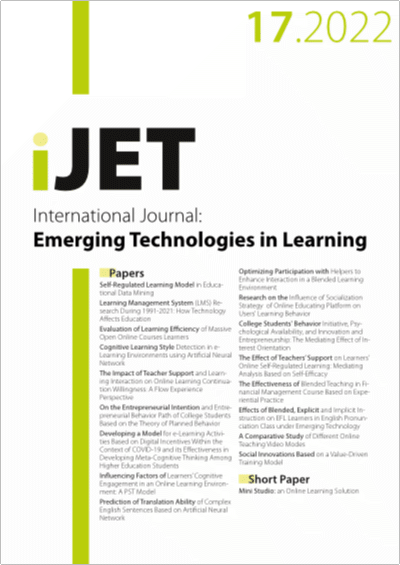Prediction of Translation Ability of Complex English Sentences Based on Artificial Neural Network
DOI:
https://doi.org/10.3991/ijet.v17i17.34167Keywords:
neural network, English translation, complex sentences, translation ability predictionAbstract
The current translation training programs at colleges and universities are not fully adequate for students majoring in English, and some students do not perform well in their execution of translation tasks. Translation ability is a frontier topic in the field of translation. A number of studies have provided some new ideas for research on the main goals of translation education and the evaluation of students’ translation abilities, but few has used artificial intelligence to predict students’ translation abilities. This paper analyzes the prediction of the translation ability with respect to complex English sentences. First, based on the principles of accuracy, operability and scientificity, an evaluation indicator system was built to fully reflect the basic characteristics of students’ ability to translate complex English sentences, which is in line with the training needs of translation talents at colleges and universities. Then, based on the characteristics of the logical structures of complex English sentences, a grey Bernoulli prediction model was constructed for the translation ability of complex English sentences. The particle swarm optimization algorithm was selected as the parameter optimization algorithm for the prediction model of translation ability with respect to complex English sentences, with the optimization targets being the Bernoulli parameters and the order of the fractional-order accumulation generation. The experimental results verified the effectiveness of the proposed model.
Downloads
Published
How to Cite
Issue
Section
License
Copyright (c) 2022 Nan Zhang (Submitter); Hua Xie, Yonghe Xiao

This work is licensed under a Creative Commons Attribution 4.0 International License.



